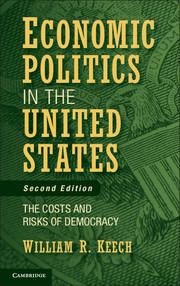Book contents
- Frontmatter
- Contents
- List of Figures and Tables
- Preface to the Second Edition
- Preface to the First Edition
- Part One Introduction
- Part Two Models of Macroeconomic Politics in a Democracy
- Part Three The Sources and Authority of Macroeconomic Goals
- Part Four Institutions and Processes
- 8 Rules, Discretion, and Accountability in the Monetary Policy Process
- 9 Rules, Discretion, and Accountability in the Fiscal Policy Process
- Part Five Conclusion
- References
- Index
9 - Rules, Discretion, and Accountability in the Fiscal Policy Process
Published online by Cambridge University Press: 05 June 2014
- Frontmatter
- Contents
- List of Figures and Tables
- Preface to the Second Edition
- Preface to the First Edition
- Part One Introduction
- Part Two Models of Macroeconomic Politics in a Democracy
- Part Three The Sources and Authority of Macroeconomic Goals
- Part Four Institutions and Processes
- 8 Rules, Discretion, and Accountability in the Monetary Policy Process
- 9 Rules, Discretion, and Accountability in the Fiscal Policy Process
- Part Five Conclusion
- References
- Index
Summary
The United States faces an easily predictable fiscal crisis of unprecedented proportions, but democratic institutions and processes are standing in the way of confronting painful choices and making responsible fiscal policy. Fiscal policy is the biggest failure of democracy in the United States since the first edition of this book appeared. A single sentence goes a long way toward explaining the problem: “The country faces a fundamental disconnect between the services the people expect the government to provide, particularly in the form of benefits for older Americans, and the tax revenues that people are willing to send to the government to finance these services.”
It is surely not new for people to want more services than they are willing to pay for. Among what is new is the size of the present and future gap between revenues and expenditures. Also, both revenues and expenditures are largely on autopilot and would take painful action to correct. There was a time, before the 1960s, when belief in the balanced budget norm was strong enough and pervasive enough to make reconnecting revenues and expenditures politically feasible, but that time is long past. The formal institutions of fiscal policy have not changed much, but the informal, unwritten institutions have changed since the 1960s.
- Type
- Chapter
- Information
- Economic Politics in the United StatesThe Costs and Risks of Democracy, pp. 205 - 236Publisher: Cambridge University PressPrint publication year: 2013



